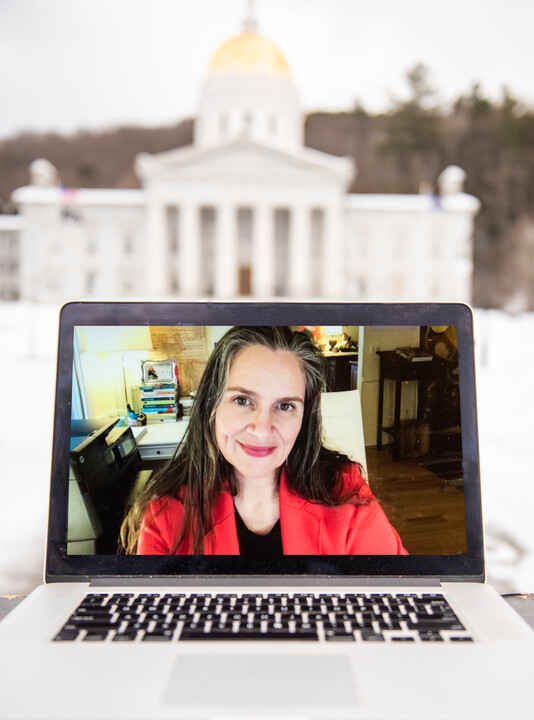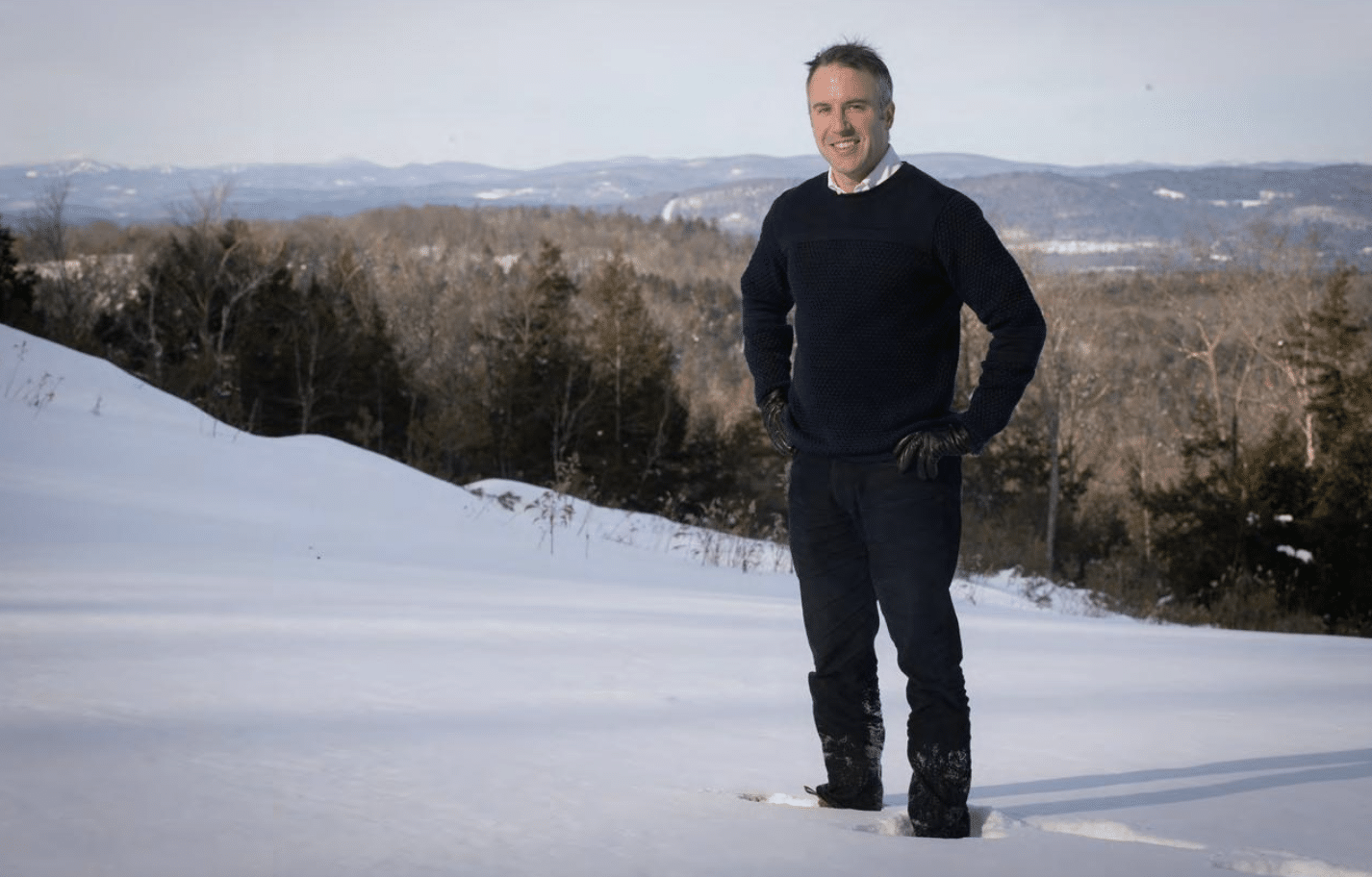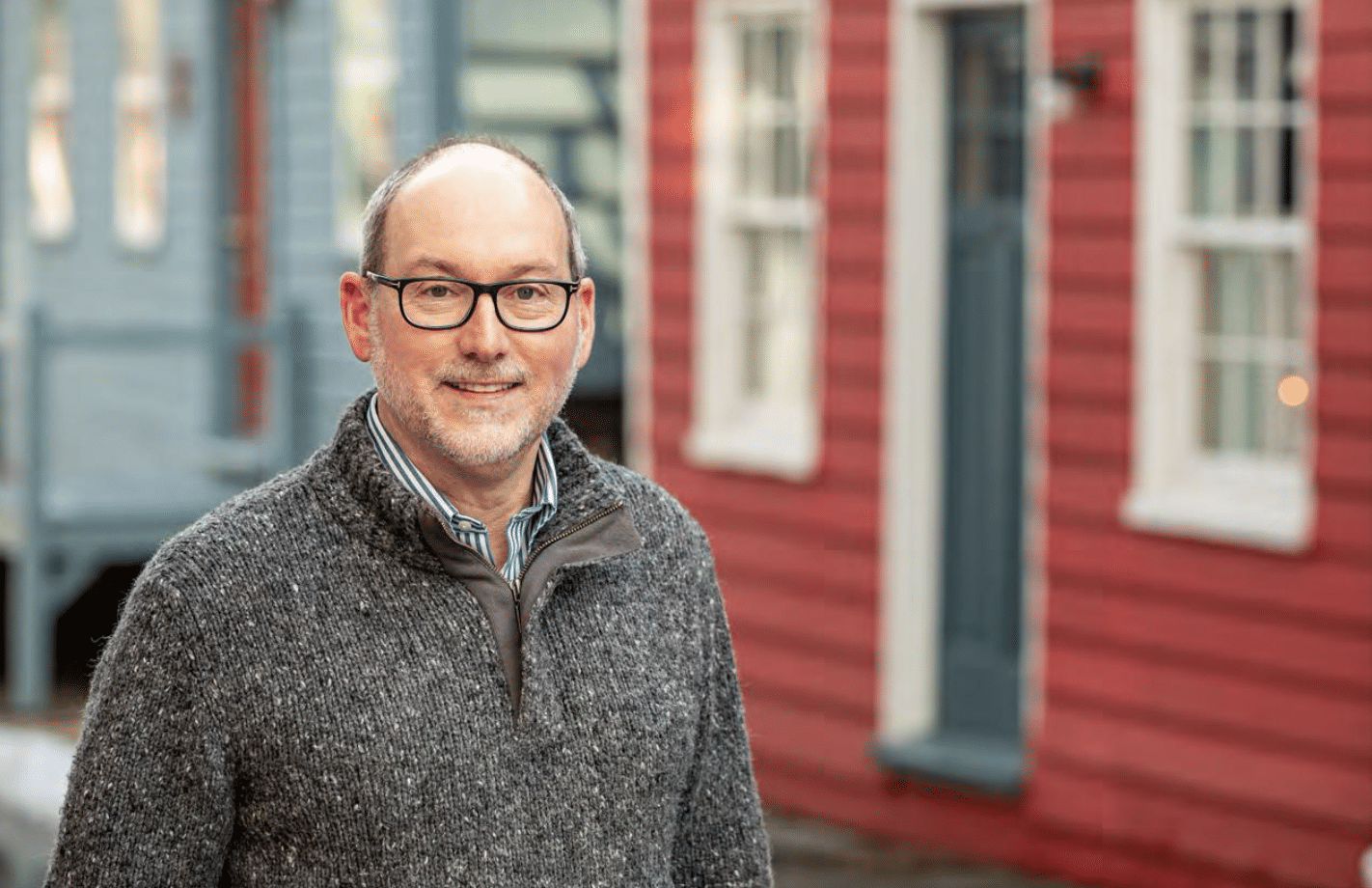July 22, 2021
As COVID-19 swept across the U.S., it dramatically altered the work lives of three Vermont Law School Alumni.
By Corin Hirsch
In the mid-afternoon of Friday, March 13, 2020, lobbyist Rebecca Ramos JD/MSEL’97 was in the cafeteria of the Vermont State House, one of her usual haunts during 12-plus hour days when the legislature is in session.

Rebecca Ramos JD/MSEL’97
Photo by Jay Ericson
She was there when she learned Governor Phil Scott had declared a state of emergency, putting in place preliminary restrictions—no out-of-state travel for state employees, no nursing home visitors, and no gatherings of more than 250 people—similar to what other governors were enacting across the country. At that point, there were two confirmed cases of coronavirus in Vermont.
For Ramos, whose work relied on face-to-face meetings with lawmakers, the announcement set in motion an extraordinary new chapter in her day-to-day life.
“For me personally, so much of my job is one-on-one conversations at the State House. That declaration changed everything,” said Ramos, who has been a lobbyist with the Montpelier-based Necrason Group for seven years. “There was ‘before’ the declaration of state of emergency, and ‘after.’ It was that sudden. We didn’t know immediately what it meant, and it took weeks and weeks to understand how it would show up in our work.”
Millions of people around the globe will remember those moments when COVID-19 canceled gatherings, closed schools, and forced people to work from home. For three Vermont Law School alumni—Ramos, Thomas Officer LLM’12, and Ronald Gunzburger JD’87—it would also add dramatic new dimensions to their professional lives.
A QUICK PIVOT
When the Vermont General Assembly is in session from January to May each year, Ramos, 48, spends the bulk of her waking hours in and around the State House, working on issues for clients as diverse as Planned Parenthood, Ben & Jerry’s, and the Vermont Land Trust. “I work on campaigns for change-type issues,” said Ramos. Her firm, founded by fellow VLS alumnus Adam Necrason JD/MSEL’96, works to influence policy on behalf of clients for issues such as renewable energy, gun safety, childcare, and the expansion of broadband.
Discussions, committee meetings, and votes that happened in person were suddenly virtual. “The state was closed. It was over. Nobody knew how the legislators would come back,” Ramos said. “Immediately that weekend, the [legislative] leadership got organized about what they were going to do, and turned things around really quickly. Our legislators are amazing. That’s one of the reasons I do this work.”
Ramos had to rethink how she would operate, too. “That human interaction is important for growing relationships. So much about committee hearings is talking to people in the hallways. And then there are no hallways. A lot of that disappeared,” Ramos said. Still, she admitted, “I really thrive in a chaotic space.”
After Ramos graduated from VLS, she worked briefly as a contracts lawyer, but after a year decided it wasn’t a path that appealed to her— so she instead gravitated toward political strategy and the shaping of policy, working with politicians such as former Governor Howard Dean and now-U.S. Representative Peter Welch when they were both heads of the Vermont Senate.
Ramos’ diverse work in and around Vermont lawmaking—as a strategist, analyst, attorney, and chief of staff—lent her a sensitivity on how to guide clients in the suddenly charged legislative climate. “We were trying to figure out how to advocate for our clients in this space, but also be respectful that we were in a pandemic. All of our agendas changed that day,” she said. “We’d say, ‘We’re not bringing your stuff into a pandemic because it’s not respectful.’ Our state was grieving. It was about being tone-smart.”
Also at stake was $2.3 billion in federal funds appropriated to Vermont to handle the emergency—money to be spent and allocated within certain criteria and in a limited timeframe. “We were trying to make sure that our clients were able to help facilitate using these dollars smartly,” Ramos said. On the affordable housing front, Necrason worked on behalf of a housing advocacy group, the Vermont Housing and Conservation Coalition, to direct $30 million to a state agency tasked with addressing homelessness. On behalf of clients, they also encouraged the state to direct COVID dollars to migrant workers, and suspend the statute of limitations. “I was so busy, but it was fun. There was a lot of following the money, and making sure clients got the right dollars,” she said.
There were, however, a few positive things that emerged from the new way of doing things. Among them, she said, is greater public participation in the legislative process, as those stuck at home could remotely watch how legislators work and laws were passed. “It’s exciting that more Vermonters can see their elected officials work. Citizen access to democracy is good, we want more of all of that. We need to focus on what is working and know it’s only temporary.”
IT’S EXCITING THAT MORE VERMONTERS CAN SEE THEIR ELECTED OFFICIALS WORK. CITIZEN ACCESS TO DEMOCRACY IS GOOD, WE WANT MORE OF ALL OF THAT. WE NEED TO FOCUS ON WHAT IS WORKING AND KNOW IT’S ONLY TEMPORARY. – REBECCA RAMOS
THE LONG-AWAITED RISE OF LEGAL TECH
When COVID-19 began to trigger executive orders across the United States, Thomas Officer LLM’12 was still living in Brooklyn and working for a legal technology startup he had helped found almost four years prior. “You hear a lot of stuff, but not all of it necessarily percolates,” he recalled. “Then you hear, ‘the National Guard is in the Bronx to enforce curfew.’”
Soon after, Officer, 34, left New York and moved back to his family’s home in Hanover, N.H., where he continued to work remotely as product designer of “Community. lawyer,” a platform designed to enable legal professionals to write applications to automate legal tasks. Up until then, he and colleagues had observed that lawyers were not necessarily tech-forward. “We would bemoan how slow lawyers are to adopt technology,” said Officer. “Then COVID hit, and the law firms I’d been working with really changed the way they do business, in a way that I think will be here forever. The machine of law started moving to react to COVID.”

Thomas Officer LLM’12 in Hanover, N.H.
Photo by Rob Bossi
After he graduated from VLS with a Master of Laws degree in 2012— earned on the heels of his Bachelor of Laws from the University of Edinburgh—Officer joined a legal tech startup called CrowdCheck as its research analyst and sixth employee. He loved the energy of the startup world and began dabbling in software development. In 2016, Officer W applied for and was chosen as a design fellow at a social-impact tech incubator called Blue Ridge Labs @ Robin Hood. “I came to straddle the tech world and the legal world,” he said, with a focus on access to justice. “There’s a huge imbalance between the demand for affordable legal services and the supply, a huge middle market of people who don’t use legal services in the way they could, or should.”
Community.lawyer—which was renamed Afterpattern in late January—was founded as a public-benefit company and “no-code platform” for building automations for things such as guided legal interviews or tools that helped clients navigate the travel ban imposed by the Trump administration in 2017.
As COVID-19 triggered new orders and restrictions—such as the cessation of in-person court proceedings—usage of the platform grew. A Kentucky attorney, for instance, used it to build an application that enabled tens of thousands of people to opt-in to the eviction moratorium, an automation subsequently customized by lawyers in other states. “They very easily changed the Kentucky parts of it to be relevant in California or wherever, and that’s a very intentional design on our part,” Officer said. “That’s what we’re trying to get lawyers to do with the things that they make—not just make them, but distribute them so other legal professionals can copy them, edit them a bit, and then use them for their own purposes. The tech is really simple. The innovative part about Afterpattern is what the lawyers create with it.”
In recent years, Officer has traveled to a handful of law schools to expose students to legal tech, and he guest lectured at VLS last spring during Professor Jeannette Eicks’ JD’96 class on E-lawyering. “I drop in, do a class or two, and get students to peek behind the curtain of this niche industry of building legal applications,” he said. “Students have made some really cool things. [Legal tech] is so new that it’s a really easy way to distinguish yourself.”
Officer still plans to work from Hanover for the foreseeable future, and seems resolute that the events of the past year have turned the page on the uses of no-code legal applications. “Afterpattern is no longer such a strange idea. The traditional model is, ‘everybody gets 100 percent of my time.’ Maybe manual service is the culprit, and we need to start advancing toward a more product-slash-service hybrid,” said Officer. “If you’re interested in access to justice, if you’re interested in social impact, community-based lawyering, if you’re interested in the entrepreneurship of law, or technology, you should absolutely have a minimum level of software competency. It’s really easy to get.”
REAL-TIME RESPONSE

Ron Gunzburger JD’87 in Annapolis, MD.
Photo by Erika Nizborski
Ron Gunzburger JD’87 has been walking to work for almost a year, four blocks through historic downtown Annapolis to the Maryland State House— specifically, to the building’s second floor, where he and a core group of about a dozen staffers for Gov. Larry Hogan have worked long weeks and months since the COVID-19 crisis descended. “[Maryland] was the second to do everything on the list,” said Gunzburger, referring to the closures and orders triggered by COVID-19, starting in March 2020. “On the whole, we were probably the most aggressive.”
That was in no small measure to Gunzburger, whose title as senior advisor to the governor—his colleague of more than 30 years—was augmented in 2020 to include “director of COVID-19 response strategy.”
In January 2020, after Gunzburger saw a Harvard epidemiologist’s provocative tweet regarding the spread of COVID, he approached the governor with an idea. “Why don’t we talk about it now, and put out a video on social media, saying ‘we’re monitoring,’ and we’re staying on top of it?” Gunzburger suggested. He was relatively fresh from helping to manage two swiftly unfolding crises—the mass shootings at Fort Lauderdale Airport in 2017 and the Stoneman Douglas High School in Parkland, Fla., in 2018, both of which occurred when Gunzburger was general counsel in the Broward Sheriff’s Office in South Florida, and part of the senior command staff on scene.
Gov. Hogan followed that advice. On March 5, he declared a state of emergency. On March 12, he announced schools would close early the following week and he restricted large gatherings. By March 15, Gov. Hogan closed casinos and race tracks, followed by bars and restaurants the next day, and movie theaters and malls on March 19. The governor, a Republican leading a heavily blue state, repeatedly landed in the national media as particularly proactive and bipartisan among his gubernatorial colleagues. “Maryland Gov. Larry Hogan emerges as a leader in early action on coronavirus,” read one NBC News headline.
“If we didn’t take action, we’d have 12,000 dead here by summer, and almost 300,000 cases,” recalled Gunzburger, citing projections from the Maryland Department of Health, epidemiologists at Johns Hopkins University in Baltimore, and other experts. “We needed to be aggressive and we needed to be fast. Every day we would stall, people would get infected and die. That was just a reality.”
Gunzburger calls himself a “lapsed lawyer.” Early in his career, he worked as an assistant public defender and assistant attorney general in South Florida, and as a law-firm partner working on civil cases—but also founded the political news website politics1.com in 1997, which he still runs (hence that heavy Twitter presence) and served as general counsel for the property appraiser’s office in Broward County before later joining the sheriff’s department.
His long-standing relationship with Gov. Hogan began when he worked on his unsuccessful campaign for Congress in the early 1990s. After that, Gunzburger advised the future governor for years before formally joining his office in March 2019 and moving to Annapolis. That year, Gunzburger was instrumental in the drafting of a law that accelerated the processing of untested rape kits in Maryland. “It was pretty incredible when something you brainstorm gets signed and becomes reality 24 hours later,” he recalled. “[The governor] had given me free-ranging authority to be the troubleshooter, even before COVID. I got to play a hands-on role in every major decision we made.”
He and his colleagues worked around the clock from February through the spring, showing up daily to their offices on the second floor of the State House and being tested for the virus weekly. “I didn’t have a day off until Memorial Day,” said Gunzburger, who eventually coauthored the state’s reopening plan, with special advisor Matt McDaniel.
While Gunzburger lamented the loss of planned international travel, he said he has spent more time with neighbors and traveled almost exclusively by foot since March. By late December, he was still trekking to COVID response meetings at the State House, even on his days off.
“I have an incredible job. In reflecting on the past year or so, keeping as many people alive as we did and keeping as many businesses open as we could, the reality is that probably nothing else we do for the rest of our careers will be as important or as impactful,” he said. “I’ll never get to do something like this for the rest of my life.”
This article was featured in the Spring 2021 Loquitur—The Alumni Magazine for Vermont Law School. Read more here.